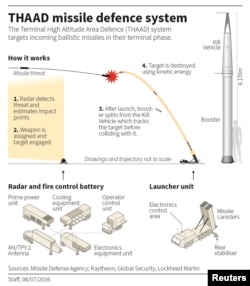Newly elected South Korean President Moon Jae-in is finding that increased diplomacy and legal maneuvers alone will not resolve the dilemma he faces over the U.S. THAAD missile defense system.
Moon advocates a more engagement oriented and less confrontational approach to reduce tensions with nuclear North Korea than his conservative predecessor ex-President Park Geun-hye, who was impeached for her alleged ties to a multi-million dollar corruption scandal.
THAAD is presenting an early test for the president’s strategy to reduce regional tensions by balancing strong support for the U.S. alliance with increasing cooperation and outreach to China and North Korea.
Washington considers the advanced anti-missile battery critical for defense against North Korea’s growing nuclear and ballistic missile capabilities. Rejecting THAAD could strain the alliance and undermine the agreed upon extended deterrence and containment strategy.
“It could lead to complete review and questioning about the posture and the deployment of U.S. forces in Korea, if they are vulnerable to a North Korean missile attack,” said Daniel Pinkston, a North Korea analyst and lecturer in international relations with Troy University in Seoul.
But supporting it will further alienate Beijing and Pyongyang that adamantly oppose the THAAD deployment as an attempt to increase U.S. military power in the region.
Many residents living near the THAAD site in a rural area of the country have also voiced concerns over the possible negative health effects of the system’s powerful radar, and are worried the battery deployment in their region puts them in danger from a potential North Korea attack.
Slow walking
During the presidential campaign Moon called for a review of the agreement to deploy the U.S. anti-missile battery.
This week the president suspended a deputy defense minster for not reporting the delivery of four additional THAAD launchers in an apparent attempt to bypass any oversight from the new administration in Seoul.He also ordered an environmental study of the site that could further delay the deployment schedule.
On Wednesday Kang Kyung-hwa, the presidential nominee for foreign minister called for the National Assembly to debate this national security matter.
“The key point of the THAAD issue is that public engagement was insufficient domestically, so it failed to reach a national consensus,” said Kang during her confirmation hearing.
Stalled engagement
In the meantime Seoul’s efforts to increase inter-Korean exchanges and humanitarian aid to rebuild trust has been met by resistance from Pyongyang.
Since Moon took office in early May, South Korea has approved 15 requests for contact with North Korea by aid and religious groups, according to the Yonhap News Agency. The National Assembly this week also called for the renewal of reunions of families that were separated by the Korean War and the partition of the Korean Peninsula at the end of World War II.
Pyongyang has not approved these exchanges, and on Wednesday the North Korean affiliated website Uriminzokkiri cited the South’s support for sanctions against the Kim Jong Un government as an impediment to cooperation. The pro-North Korean website called on the Moon government to drop sanctions and restore severed economic ties, including the Kaesong Industrial complex that employed thousands of North Koreans and the Mount Kumgang tourism project.
North Korea has also not indicated any willingness to even discuss a pause in its continued testing of ballistic missiles and nuclear technology.
“As we say in English, what’s the expression, it takes two to tango. In Korean they have a term called “jak sarang” or one-sided love. If the other party doesn’t return the love, then you are stuck in this situation,” said Pinkston.
The Moon administration has so far been undeterred by early resistance to their efforts. The foreign minster nominee said Wednesday they would continue to pursue both sanctions and humanitarian aid to bring about peaceful change on the Korean peninsula.
Youmi Kim contributed to this report.






